

DMCA: The Digital Millennium Copyright Act. Introduction On October 12, 1998, Congress passed the Digital Millennium Copyright Act (DMCA).
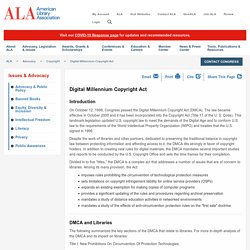
The law became effective in October 2000 and it has been incorporated into the Copyright Act (Title 17 of the U. S. Code). This landmark legislation updated U.S. copyright law to meet the demands of the Digital Age and to conform U.S. law to the requirements of the World Intellectual Property Organization (WIPO) and treaties that the U.S. signed in 1996. The TEACH Act and some Frequently Asked Questions. What Librarians Need to Know about the New Copyright Alert SystemDistrict Dispatch. Late last month, the Center for Copyright Information (CCI) launched its Copyright Alert System, creating a new effort by rights holders (including the Recording Industry Association of America and Motion Picture Association of America) and Internet Service Providers (ISPs), such as Comcast, Verizon, Cablevision and Time Warner Cable) to curb online copyright infringement.
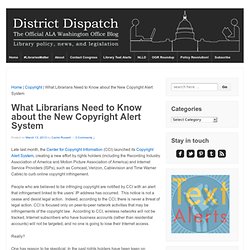
People who are believed to be infringing copyright are notified by CCI with an alert that infringement linked to the users’ IP address has occurred. This notice is not a cease and desist legal action. Indeed, according to the CCI, there is never a threat of legal action. CCI is focused only on peer-to-peer network activities that may be infringements of the copyright law.
According to CCI, wireless networks will not be tracked, Internet subscribers who have business accounts (rather than residential accounts) will not be targeted, and no one is going to lose their Internet access. About the Center for Copyright Information. Today, there are many different ways to access digital entertainment like music, movies, TV shows, games and books.
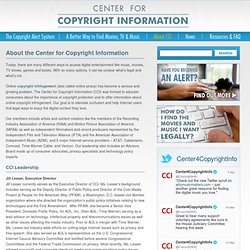
Center for Copyright Information. Pinterest Copyright Issues Could Spur Changes To Terms Of Use And ‘Pin Etiquette’ Pinterest, the hugely popular website that lets people share photos and images on a virtual pinboard, has had trouble brewing for a while over what some people say are frequent copyright violations that happen when users ‘pin’ photos on the site without permission.
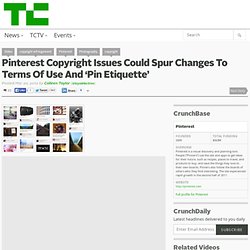
But one woman recently discovered that the copyright issue at Pinterest is a little more complicated than that: Pinterest’s own rules of etiquette make it very difficult for regular people to use the site at all without being liable in the event of a copyright lawsuit. Kirsten Kowalski blew the whistle on this issue in a blog post that went viral late last month. Kowalski, who lives in Alpharetta, Georgia, is a triple-threat of sorts: A professional photographer at DDK Portraits, a corporate lawyer, and a passionate Pinterest user. Carrie Russell: Director - Program on Public Access to InformationDistrict Dispatch. Appeals court decision undermines free speech, misinterprets copyright law Last week, the American Library Association (ALA) joined an amicus brief calling for reconsideration of a 9th circuit court decision in Garcia v.
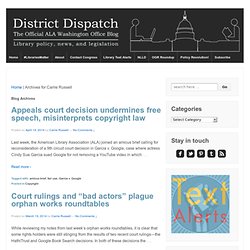
Google, case where actress Cindy Sue Garcia sued Google for not removing a YouTube video in which… Court rulings and “bad actors” plague orphan works roundtables While reviewing my notes from last week’s orphan works roundtables, it is clear that some rights holders were still stinging from the results of two recent court rulings—the HathiTrust and Google Book Search decisions. Digital Rights Management (DRM) & Libraries. Digital rights management (DRM) technology controls how digital information resources, including media, can be accessed, copied, distributed, reformatted, or otherwise changed.
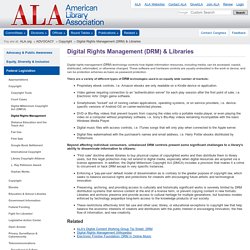
These software and hardware controls are usually embedded in the work or device, and can be protection schemes as basic as password protection. Creating. Creative Commons. About. Want to let people share and use your photographs, but not allow companies to sell them?
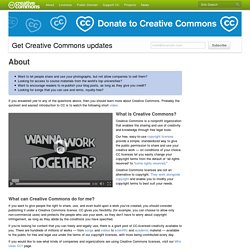
Looking for access to course materials from the world’s top universities? Want to encourage readers to re-publish your blog posts, as long as they give you credit? Looking for songs that you can use and remix, royalty-free? If you answered yes to any of the questions above, then you should learn more about Creative Commons. Probably the quickest and easiest introduction to CC is to watch the following short video: What is Creative Commons?
Creative Commons is a nonprofit organization that enables the sharing and use of creativity and knowledge through free legal tools. Copyright and Primary Sources Online Module. Fair Use. U.S.
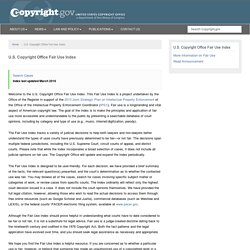
Copyright Office Fair Use Index Welcome to the U.S. Copyright Office Fair Use Index. This Fair Use Index is a project undertaken by the Office of the Register in support of the 2013 Joint Strategic Plan on Intellectual Property Enforcement of the Office of the Intellectual Property Enforcement Coordinator (IPEC). Resources. Copyright for Librarians and Teachers, in a Nutshell. You may have wondered whether you hold the copyright to work you’ve put many hours into creating on the job.
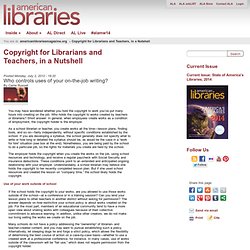
Who holds the copyright to works created by teachers or librarians? Short answer: In general, when employees create works as a condition of employment, the copyright holder is the employer. As a school librarian or teacher, you create works all the time—lesson plans, finding tools, and so on—fairly independently, without specific conditions established by the school.
Carol Simpson. Taking the Mystery Out of Copyright. Skip navigation Library of Congress Teachers Suggestions enabled.
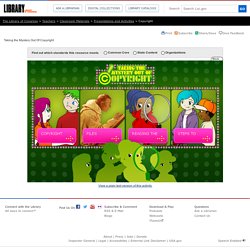
The Library of Congress > Teachers > Classroom Materials > Presentations and Activities > Copyright Print Subscribe Share/Save Give Feedback Taking the Mystery Out Of Copyright View a plain text version of this activity. Connect with the Library All ways to connect Find Us On Subscribe & Comment Download & Play. Copyright for K–12 Librarians and Educators (ALA Editions Workshop) - Books / Professional Development - Books for School Librarians - eLearning - New Products - Products for Children. Www.arl.org/storage/documents/publications/code-of-best-practices-fair-use.pdf. Free Bibliography Generator - MLA, APA, Chicago citation styles.